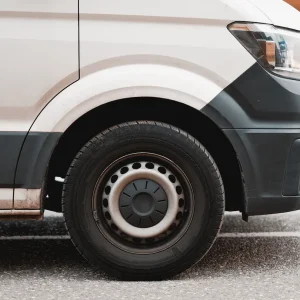What with cyclists coming at them from all directions, pedestrian wandering out in front of them and car drivers constantly cutting them up, Britain’s van drivers need to keep their wits about them. They need a bit of technological assistance too.
That is something that has long been recognised by Mercedes-Benz. It has invested heavily in a variety of onboard packages either fitted as standard or offered as options designed to make it less likely that drivers will collide with other road users.
That is why we have awarded the manufacturer our 2017 Safety Award. One of the van maker’s systems is Blind Spot Assist. It does exactly what it says on the tin: makes whoever is behind the wheel aware of other road users who may be sitting unnoticed in the van’s blind spot.
The warning is delivered by a red triangle that illuminates in either the nearside or the offside exterior mirror as appropriate. Ignore it and signal that you are pulling out and the triangle will start to flash to the accompaniment of a buzzer.
Lane Keeping Assist is also available. It urges you back to wakefulness if you start to nod off at the wheel and your vehicle begins to wander into an adjacent lane.
If you are getting just that bit too close to the vehicle in front then Collision Prevention Assist will warn that you have entered the danger zone. That should give enough time to hit the brakes and avoid the danger.
Yet another feature is Highbeam Assist, which prevents your headlights from dazzling other drivers at night.
Definitely worth a look is Tyre Pressure Monitoring System. It warns if tyre pressures are lower than they should be – maybe because it has been ages since they were last checked, or because of a slow puncture – so that you can take appropriate action rather than wait for a sudden and potentially disastrous deflation.
An especially useful initiative is Crosswind Assist. It stops the van from being blown into the next lane on an exposed section of motorway or dual-carriageway by a powerful crosswind and potentially into the path of another vehicle.
Then there is Disc Wipe, which clears the film of water from brake discs in wet weather, while Electronic Brake Prefill shortens brake reaction times.
If the worst does happen, however, and a crash occurs, then a QR code, displayed on the cab’s B-pillars, can be scanned by fire fighters. It reveals the precise location of the electric cables, airbags and fuel tank so that the fire fighters do not accidently chop through them while trying to rescue somebody.
Although the availability of the foregoing systems varies a little from model to model, no matter which variant you pick the Mercedes-Benz philosophy that underpins them helps guard against accidents.
Read through any van manufacturer’s catalogue and you risk being bemused by a rag-bag of initials that describe safety devices, some of which are standard and may be required by legislation, some of which are optional. Mercedes-Benz’s products are of course no exception.
Included in its safety blanket alongside ABS is an Electronic Stability Programme (ESP) that takes into account the positioning of the van’s load prior to intervening. It can be combined with Roll Over Mitigation and Roll Movement Intervention.
Fitted too is Start-off Assist, which should stop you rolling backwards when pulling away on a hill.
Other features include Electronic Brakeforce Distribution (EBD), acceleration skid control (ASR), hydraulic brake assistance (BAS), and Trailer Stability Assist.
Highly Commended: IAM RoadSmart

IAM RoadSmart’s approach to driver training and the packages it can offer wins our Highly Commended award. The portfolio it has developed addresses everything from one-on-one driving tuition and assessment to seminars, group workshops and talks that deal with everything from speeding to winter driving.
Training can be conducted at the customer’s premises and trainers can come in early in the morning before the shift starts or later in the day once the shift has finished.
Delegates can gain a better understanding of the risks inherent in, for example, driving while tired or while using a mobile phone. They can also learn how to drive in a fuel-efficient manner.
Potential benefits can include everything from fewer accidents and reduced insurance costs to lower fuel bills and a smaller carbon footprint.





